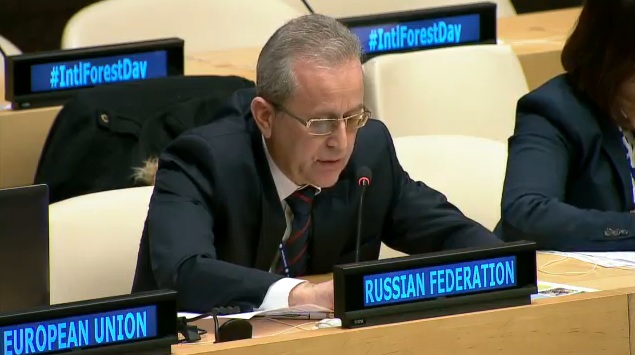Statement by Mr. Sergey Kononuchenko, Deputy Permanent Representative of the Russian Federation to the United Nations at the ECOSOC Special Event on the International Day of Forests
Mr. Chair,
It is hardly possible to underestimate the significance of forests for the biosphere. They ensure environmental protection of our planet, play a critical role in climate change mitigation and adaptation and serve as a home to 80 percent of terrestrial biodiversity. We rely on forests as providers of many essential services, such as clean water, food, medicine and fuel.
Against this backdrop, it is crucial that sustainable management of forests has been recognized in the 2030 Agenda for Sustainable Development as an important component of social and economic development. Specifically mentioned in Goals 6 and 15 on water and life on land, forests cut across many other issues. They are natural creators of ecosystems making a great impact on terrestrial life and atmosphere. That is exactly why the progress on forests will, in turn, ensure success of our efforts on other goals and targets.
This integrated approach has become a basis for the United Nations Strategic Plan for Forests and its Global Forest Goals that will guide our implementation of the 2030 Agenda. We also hope that the Plan will be a powerful communication tool raising awareness about the diverse role of forests and measures needed for their sustainable management. In this respect, we reiterate our continuous support to the UN Forum on Forests mandated to address forest-related issues in an integrated and holistic manner.
In the context of our today’s discussion, this year is especially significant for my country as the Russian Federation has officially declared 2017 the Year of Ecology. Russia is home to more than 20 percent of world’s forests, as well as the largest share of all boreal forests that play a special role in countering climate change by absorbing a large portion of greenhouse gases.
To protect our forests, we are taking action by introducing reforms to the legislation and carrying out concrete projects. In 2017 alone, we are planning to restore 800,000 hectares of forests nationwide paying special attention to the Lake Baikal Protected Area – a unique ecosystem that has recently suffered from fires.
Special emphasis will be made on working with the wider public, in particular young people. We are organizing a series of interactive events to spread the word about environmental protection, sustainable management of forests and prevention of forest fires. This spring, we will conduct tree-planting activities in the framework of the annual National Arbor Day that are expected to involve over 5 million people.
In order to create institutional capacity for tackling illegal logging, the Irkutsk Region of the Russian Federation will, on a trial basis, introduce timber labeling that will allow to reveal illegal timber and also eliminate any possibility for unlawfully produced timber to enter the market.
Another effective instrument to save Russia’s pristine forests is designation of Protected Areas. Since 1992, their size has nearly doubled across the country. This year, we are planning to additionally establish 7 national parks, 2 state natural reserves and 2 federal refuges, as well as to further expand the existing Protected Areas.
It is highly relevant that this year the International Day of Forests is focusing on energy. Indeed, forest products, along with other renewable resources, ensure energy security and, at the same time, provide an alternative to fossil fuels minimizing their negative impact on climate change and the environment. With this in mind, we estimate that contribution of forest bioenergy to tackling environmental challenges will be increasing.
It is worth mentioning that usually almost a half of timber is used for heating and cooking. The global biofuel market is rapidly developing thanks to new technologies and support rendered by governments across the globe.
Russia is also an active participant of this process. We attach a high priority to investments in production of pellet fuels and development of local energy systems on the basis of wood biomass. A number of Russian regions are already modernizing their local energy systems by replacing heating oil and coal with wood biomass, namely waste wood, pellet fuel, firewood and other products.
The need to stimulate the use of renewables, especially those that are locally available, is stipulated in Russia’s 2035 Energy Strategy. Also, we are currently preparing the 2030 Strategy for Forestry Development that will address integration of the best available technologies related to the forest sector with a view to increase energy efficiency, as well as creation of an enabling environment for using timber for construction of buildings and other appropriate purposes.
I thank you.
